Federal Politics More Competitive; Reviews of Trudeau Trump Meeting Are Positive
February 24, 2017
The Canadian political dynamic is more competitive, largely because of shifting results in Ontario: where the Liberal brand has lost a bit of appeal and we see strengthening interest in the Conservatives. In BC, the Liberals remain well ahead, but the NDP have picked up some ground in the last couple of months.
Nationally, 40% would vote Liberal today, the same number as supported the party in last October’s federal election. 32% would vote Conservative, also equal to the result they achieved last election. Just 16% would vote NDP, which is four points lower than the party’s 2015 election result.
The gap between the two largest parties has narrowed from 21 points in November to 8 points today. This gap remains wide in Atlantic Canada, Quebec, and fairly wide in BC, but is now virtually non-existent in Ontario.

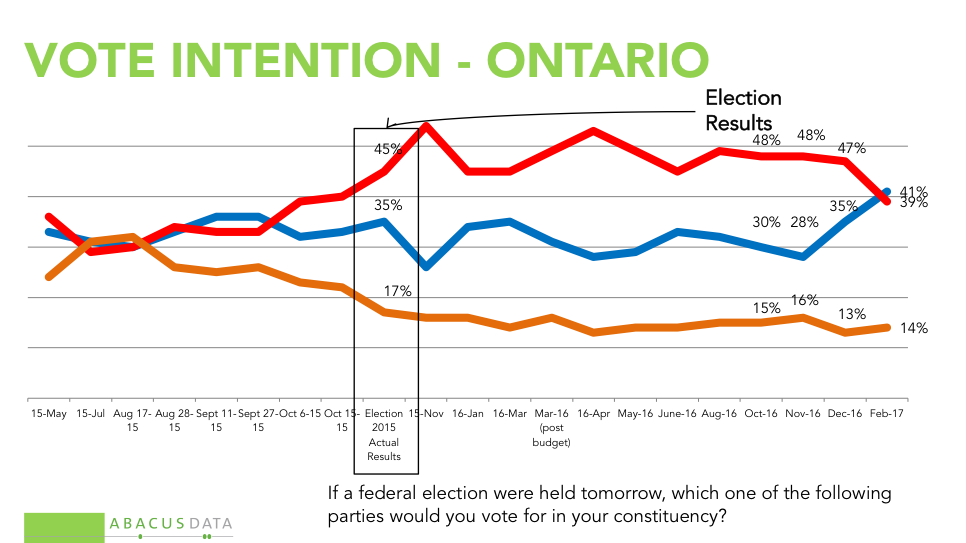
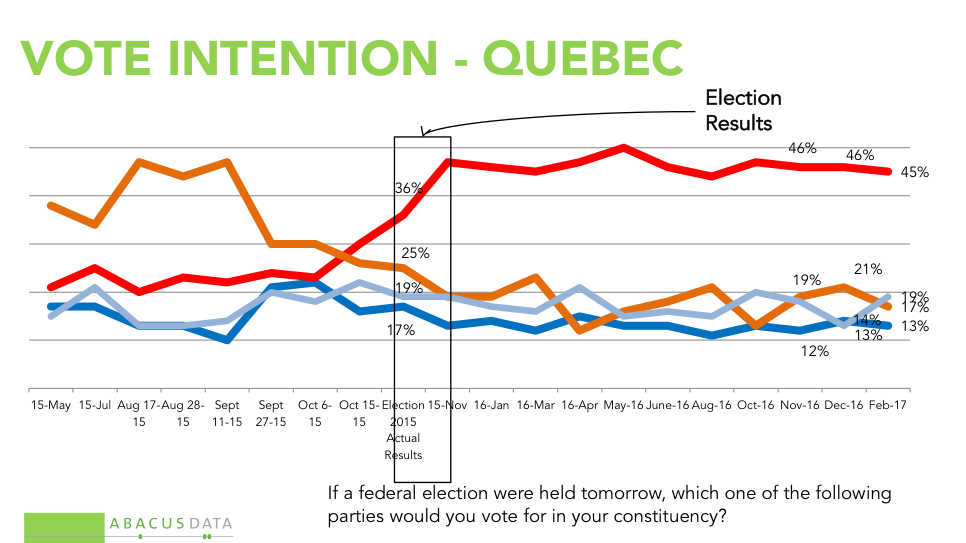
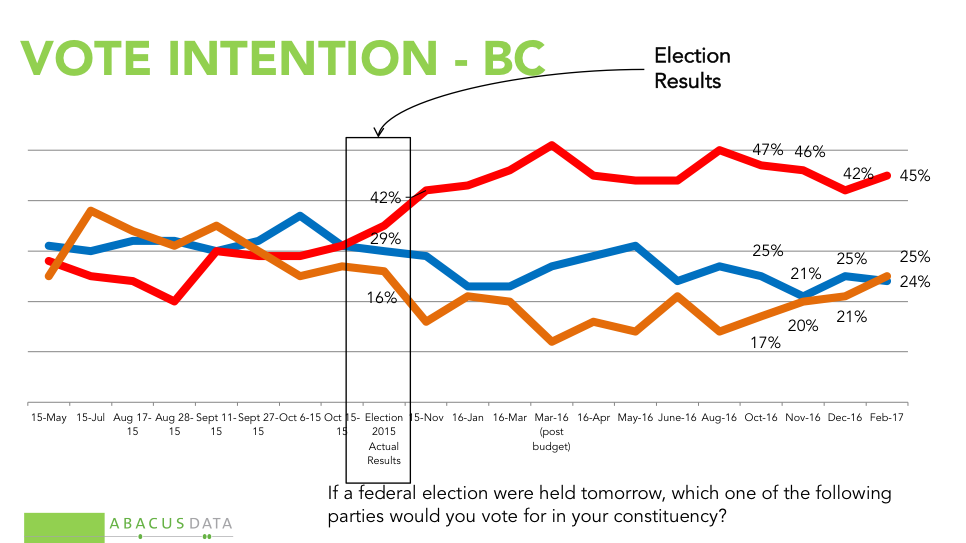
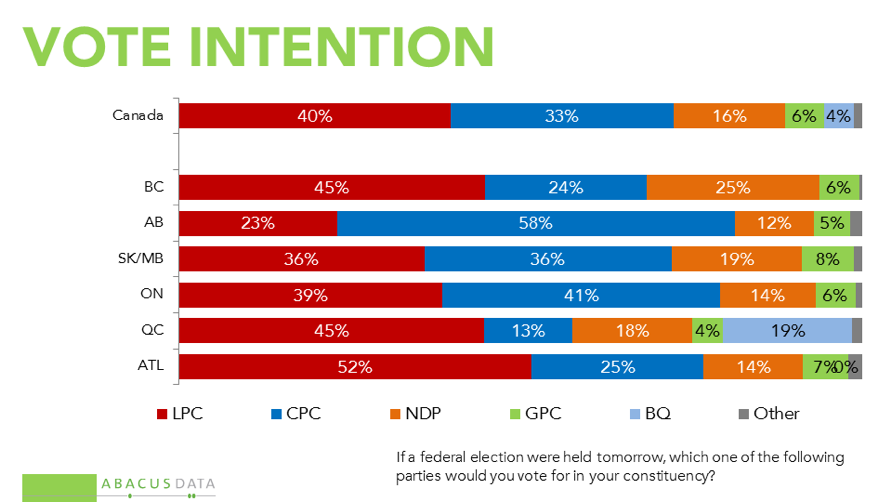
Much of the loss in support for the Liberals has come from those who self-identify as left or centre-left on the political spectrum. In December, 56% of those on the left supported the Liberal. Today, it’s 47%, a decline of 9 points. There has not been any change in support for the Liberals among those in the centre (unchanged from December) or on the right (down 1).
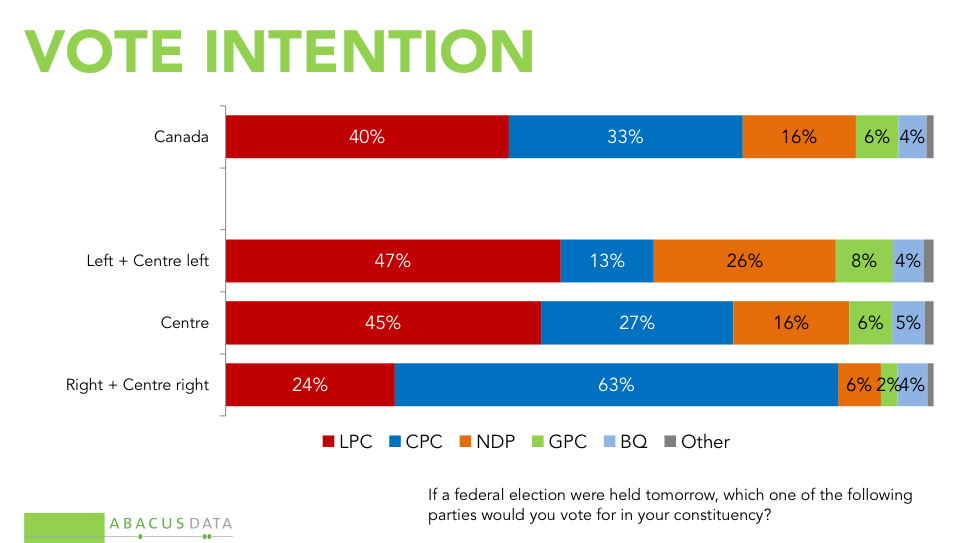
GOVERNMENT APPROVAL
Today, 49% approve of the performance of the government, while 33% disapprove.
Approval levels have dropped 8 points from their peak last August, and disapproval rose by 9 points. During these months, the Trudeau government made several choices that likely disappointed some on the right, as well as some on the left, of the spectrum. Major announcements included high profile policy choices to tax carbon, approve pipelines, and shelve plans to reform the electoral system.
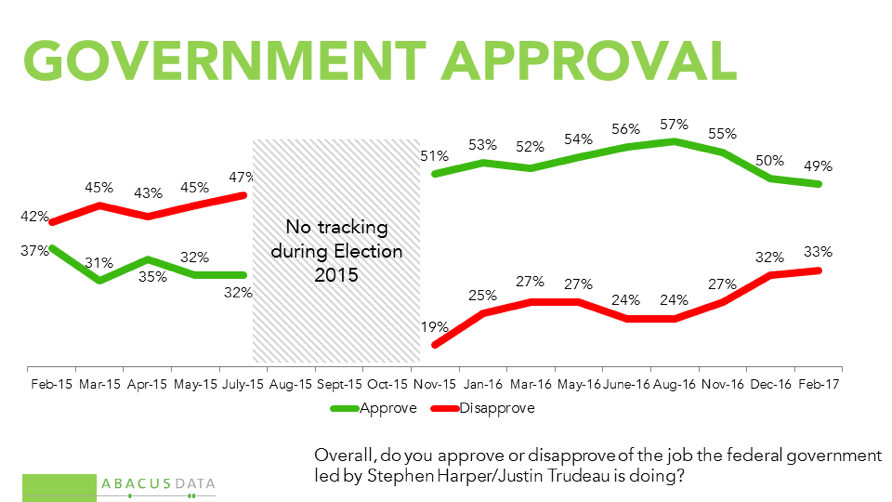
Ottawa’s approval rating is highest in Atlantic Canada (60%), BC (58%), and Quebec (54%) while lowest in Alberta (30%). While our ballot preference question shows a dead heat in Ontario, the Trudeau government approval rating in the province actually improved slightly from December 2016.
(This finding suggests that the appearance of a tighter federal contest may have at least something to do with the downward pressure on the Liberal brand for the provincial Liberal Party. The Ontario Liberal Party is trailing the Conservatives by 14 points in the average of recent provincial polls, and Premier Wynne is struggling with a 70% unfavourable rating.)
The toughest market for the Trudeau government remains Alberta where net approval has continued to decline.
80% of those who said they voted Liberal in 2015 say they approve of the job performance of the federal government. Only 9% disapprove. Almost half of NDP voters approve (46%) while fewer than one in five Conservative voters (17%) feel positive about the federal government’s performance. Looking back to January 2016, the most notable movement has been a shift downward among NDP voters.
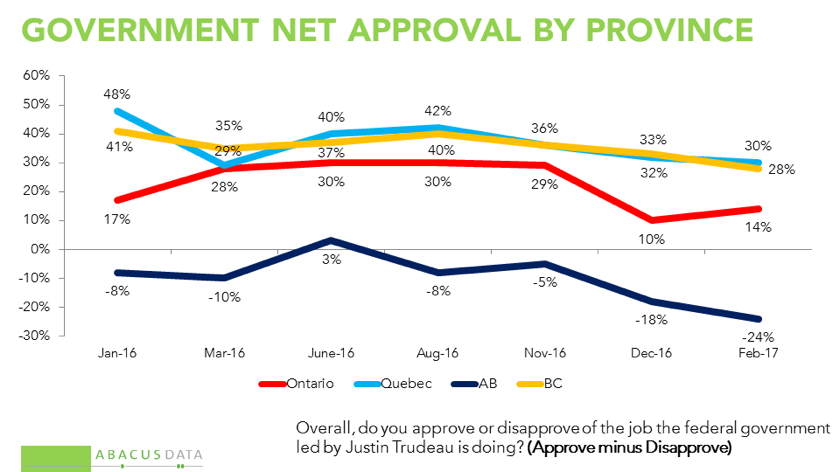
ASSESSING PM TRUDEAU’S VISIT TO WASHINGTON
Public reactions to the visit by Prime Minister Trudeau to Washington to meet President Trump have generally been quite positive reactions:
• Most (67%) said they thought the PM did a good job representing Canadian interests, another 35% said he did an acceptable job. Only 8% felt he did a bad job. These views were unusually similar across partisan and ideological groups.

• Most Canadians (72%) think Mr. Trudeau will be able to have as good a relationship with the US president as is possible, while 28% believe another Canadian leader would do better. 92% of Liberal voters and 78% of NDP voters feel Trudeau will be able to have a good relationship with President Trump as possible, as do 41% of Conservative voters.
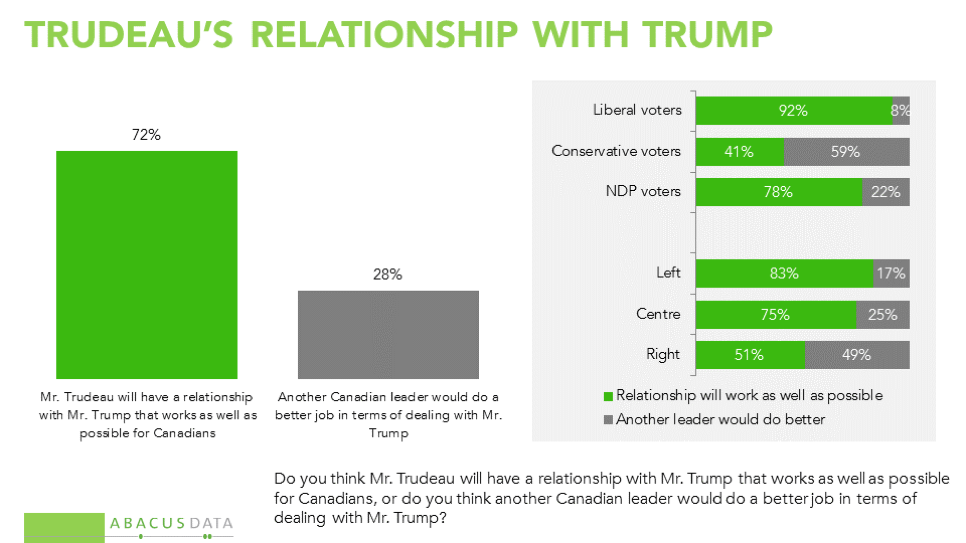
• When asked if Stephen Harper or Justin Trudeau would do better in managing Canada’s relationship with President Trump, 60% said Trudeau would. Liberal and NDP voters broadly preferred Mr. Trudeau while 84% of Conservatives preferred Mr. Harper.

• A substantial majority (68%) said that Mr. Trudeau struck the right balance in how he approached the US President, while 32% said they thought the Canadian PM should have been more forceful in making the point that many Canadians do not agree with some of Mr. Trump’s policies. Notably, partisan differences on this question were quite mild.
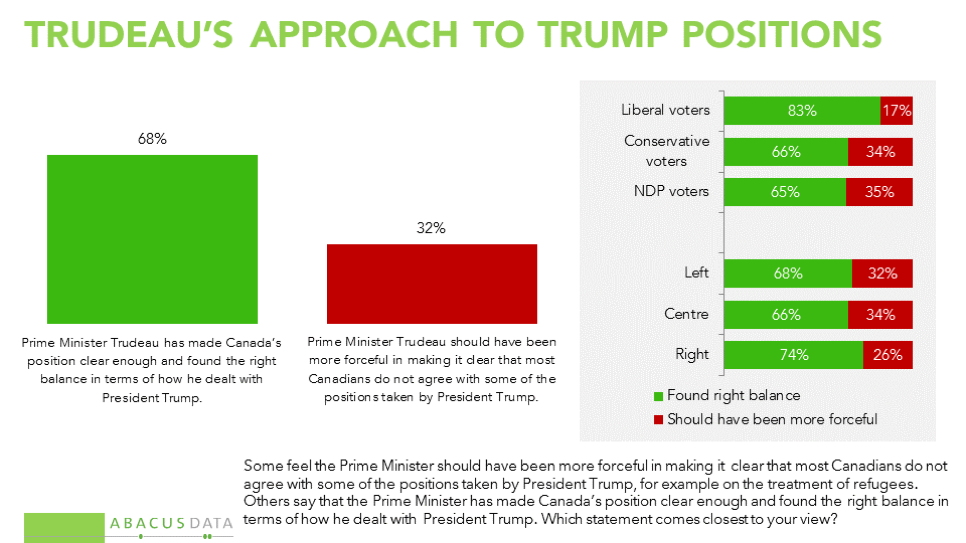
UPSHOT
According to Bruce Anderson:
“Having made a series of policy choices that were bound to disappoint or frustrate some voters in recent months, it’s not surprising that our polling is showing some softening and a more competitive dynamic.
At the same time, it’s important to distinguish the driving forces behind the shifting landscape. Alberta Conservatives are more unhappy than they were. In BC, the Liberals have seen some ground gained by the NDP, which likely has had to do with decisions on electoral reform and pipelines. In Ontario, the prudent analysis is to disentangle whether voters are softening on the federal Liberals as opposed to expressing frustrations with their Liberal Premier. We’ll return to that in our next survey.
Reactions to Mr. Trudeau’s visit with President Trump signal ongoing confidence in how Mr. Trudeau is representing Canada’s values and interests in his international affairs work. Many Canadians have discomfort with some of the approaches taken by the US President, but it’s clear that they see the Prime Minister as having a responsibility to build a constructive dialog, given the importance of the economic relationship, and the strong links that exist between our countries, separate and apart from politics.”
According to David Coletto:
“The political landscape in Canada is far more competitive today than only a few months ago. The post-election boost in Liberal support has subsided and we have reverted to vote intentions that closely mirror the results of the last federal election.
Government approval is down below 50% for the first time since the election but apart from those in Alberta, Canadians in others regions of the country continue to show substantial support for the government’s performance. 35% or less disapprove of the Trudeau’s government’s performance in Atlantic Canada, Quebec, Ontario, and British Columbia.
We suspect that the unpopularity of the Wynne government in Ontario is putting pressure on the Liberal brand in the province which may help explains the gap between approval ratings and vote intentions.”
METHODOLOGY
Our survey was conducted online with 1,500 Canadians aged 18 and over from February 17 to 19, 2017. A random sample of panelists was invited to complete the survey from a large representative panel of over 500,000 Canadians.
The Marketing Research and Intelligence Association policy limits statements about margins of sampling error for most online surveys. The margin of error for a comparable probability-based random sample of 1,500 is +/- 2.6%, 19 times out of 20.
The data were weighted according to census data to ensure that the sample matched Canada’s population according to age, gender, educational attainment, and region. Totals may not add up to 100 due to rounding.
ABACUS DATA INC.
We offer global research capacity with a strong focus on customer service, attention to detail and value-added insight. Our team combines the experience of our Chairman Bruce Anderson, one of Canada’s leading research executives for two decades, with the energy, creativity and research expertise of CEO David Coletto, Ph.D.




